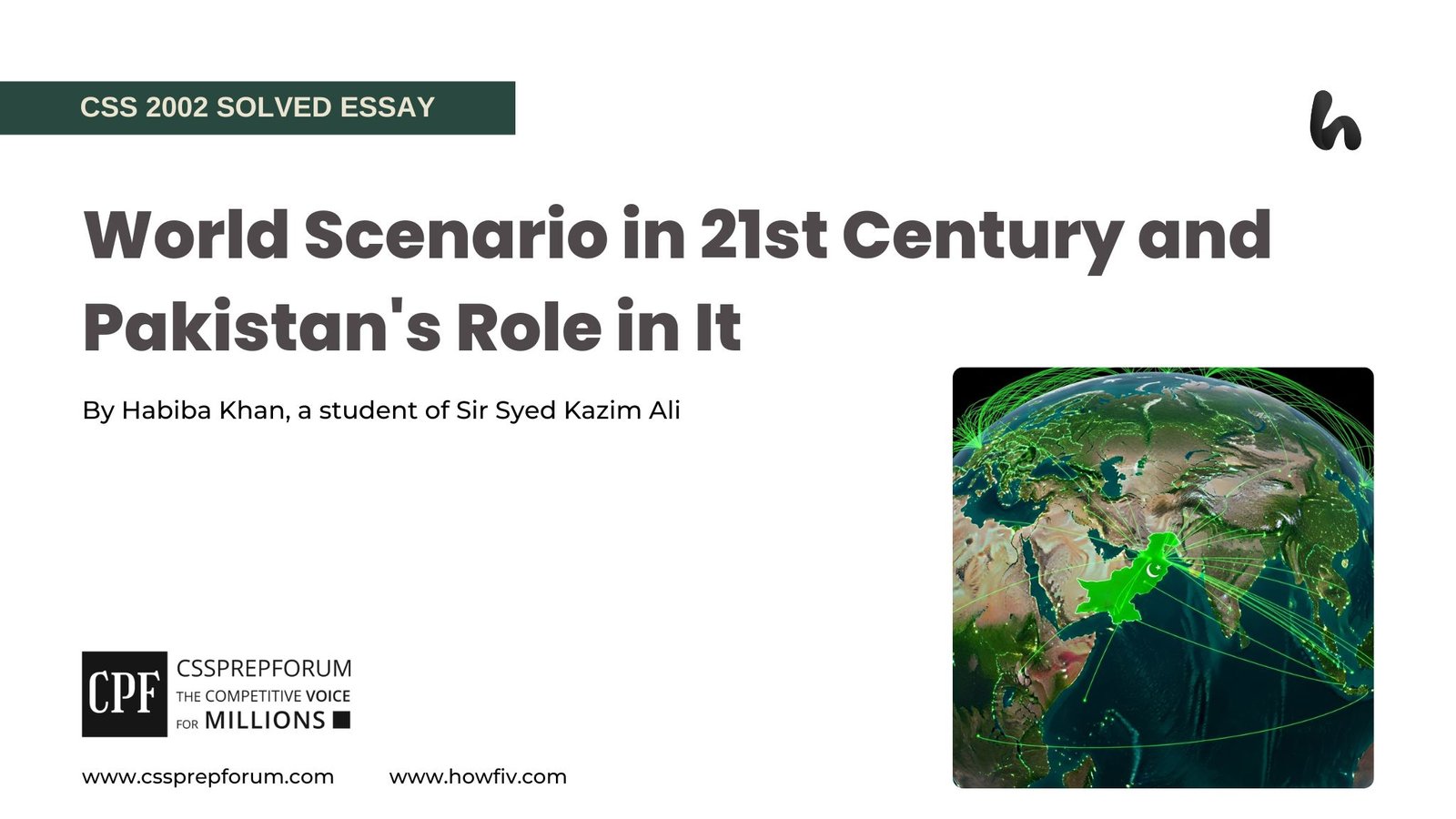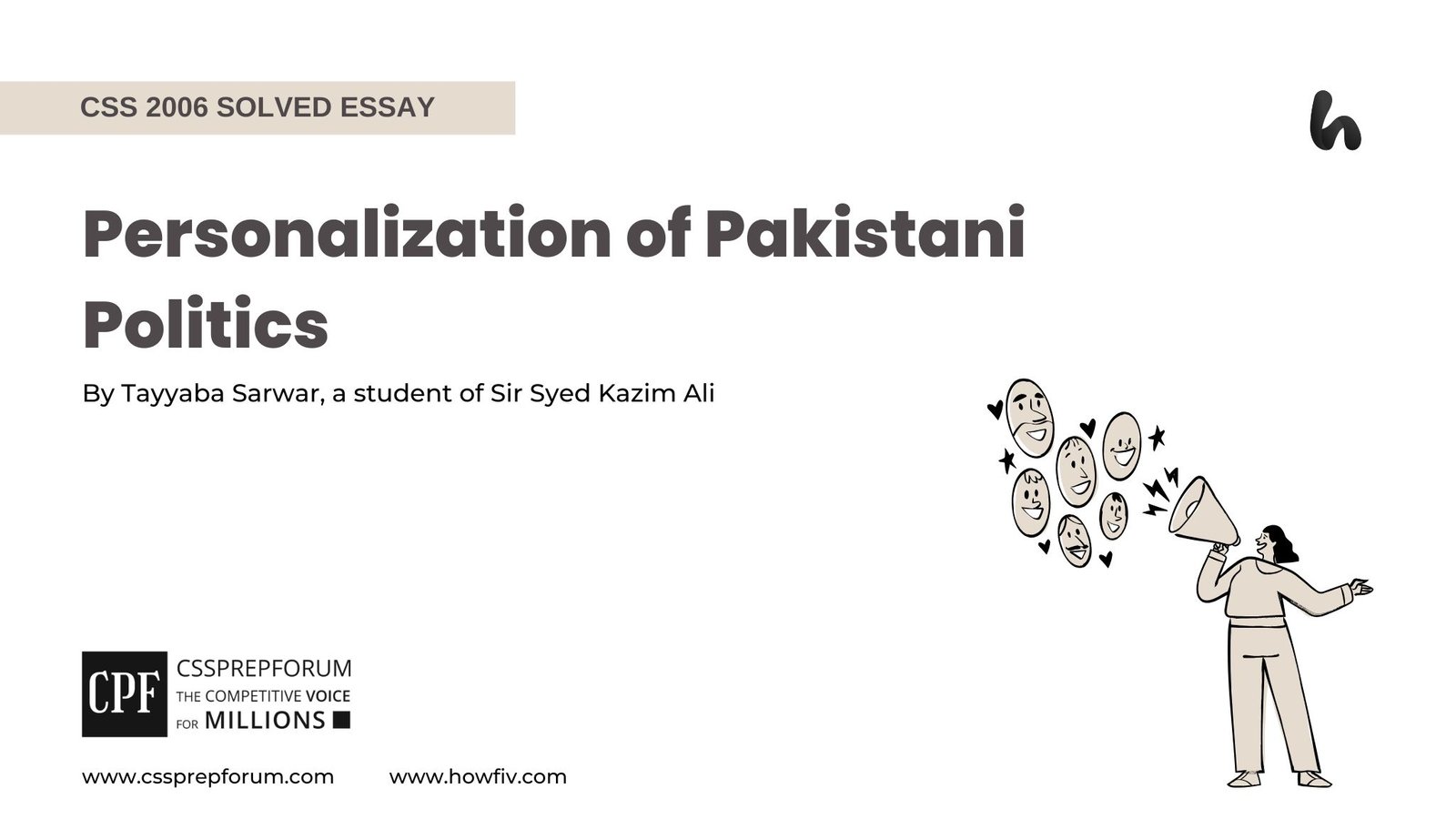CSS 2020 Solved Current Affairs Past Papers | Pakistan’s Inclusion in the FATF grey list
The following question of CSS Current Affairs 2020 is solved by Sir Ammar Hashmi, the best Current Affairs Coach, on the guided pattern of Sir Syed Kazim Ali, which he taught to his students, scoring the highest marks in compulsory subjects for years. This solved past paper question is uploaded to help aspirants understand how to crack a topic or question, how to write relevantly, what coherence is, and how to include and connect ideas, opinions, and suggestions to score the maximum.

Question Breakdown
This question has three parts. The first part requires the reasons for Pakistan’s placement on the FATF grey list, the second part requires implications associated with this, and the third part requires measures that Pakistan should undertake to move out of the grey list.
Outline
1-Introduction
2-Financial Action Task Force (FATF)
3-Pakistan and FATF
4-Factors behind Pakistan’s inclusion on the Grey list
- ✓ A Weak Regulatory Framework
- ✓ Terror financing and money-laundering groups
- ✓ Political Instabilities
- ✓ Lack of Economic Transparency
- ✓ International Pressure
5-Implications of the Grey Listing for Pakistan
- ✓ Economic Fallout
- ✓ Political Repercussions
- ✓ Security Concerns
- ✓ Impact on International Relations
6-Strategies for Pakistan to exit Grey list of FATF
- ✓ Revise Regulatory Reforms
- ✓ AML and CFT Rules
- ✓ Target terrorist financing networks
- ✓ Enhance International Cooperation and Information Sharing
4-Critical Analysis
5-Conclusion

Answer to the Question
Introduction
FATF is an inter-governmental organization that has set international standards to prevent illegal activities around the globe and the harm they cause to the respective societies. The basic role of FATF is to go after illicit funding, which is linked to malicious activities like drug and organ trafficking, terrorism spending, cybercrime, illegal arms trade, corruption, organized crimes and other subversive activities. In 2018, again, Pakistan was added to the grey list because of the lack of “Strategic Deficiencies” in overcoming corruption, terrorism financing and tax evasion. Some of the factors behind its greylisting are the weakness of the regulatory framework, terror financing, money laundering, etc. This can have drastic implications for Pakistan’s international reputation, security concerns and other political repercussions. Pakistan needs some serious progress related to terror financing through prosecution and investigation, demonstrating that the trial is effective and results in the form of targeted financial sanctions against designated terrorists.
Financial Action Task Force (FATF)
The Financial Action Task Force is the global terrorist financing and money laundering watchdog. It is an inter-governmental organization that has set international standards to prevent global illegal activities and the harm they cause to their respective societies. It serves as a policy-making body that persuades national legislative bodies to bring appropriate regulatory and legislative reforms in grey-listed countries. It was formed at the G-7 Summit in Paris in 1989. Currently, its member countries have increased to forty. The basic role of FATF is to go after illicit funding, which is linked to malicious activities like drug and organ trafficking, terrorism spending, cybercrime, illegal arms trade, corruption, organized crimes and other subversive activities.
Pakistan and FATF
United Nations passed resolution 1267 unanimously in October 1999 to designate the then Al-Qaeda leader, Osama Bin Laden, and his associate members as terrorists. According to this resolution, it becomes the responsibility of member states to ensure that their territory isn’t being used for terrorist camps and their installations. It also demanded all member states to freeze assets and financial resources associated with the Taliban. Although Pakistan launched several military operations in tribal areas and successfully destroyed terrorist infrastructure, the US and other superpowers continued to put pressure on Pakistan. After 2008, Pakistan is relisted in the FATF grey list for the second time due to its so-called non-compliance with UNSC resolution. They insisted Pakistan to freeze the assets, ban travelling ban and put an arms embargo on militant groups. In 2018, again, Pakistan was added to the grey list because of the lack of “Strategic Deficiencies” in overcoming corruption, terror financing and tax evasion. In June 2021, Pakistan managed to complete all prerequisites in advance of the deadlines, therefore evading the grey list of FATF, but is still continuously trying to improve its international image.
Factors behind Pakistan’s inclusion on the Grey list
- ✓ A Weak Regulatory Framework
Pakistan has a diversified financial system, although commercial banks dominate it; there is a stock market and a variety of investors and other non-bank financial institutions like development finance institutions (DFIs), mutual funds, housing, leasing, investment banks, and insurance Islamic finance companies. However, at the core lies the inadequacy and weakness of financial regulations and relevant authorities within a country. For example, suppose the tax department is weak enough to question the elites, politicians, and public about their earnings, assets and “monetary and nonmonetary” holdings. In that case, it is very easy for professional criminals and the general public to evade taxes, hide their properties and involve themselves in illicit money laundering activities. The same case applies to Pakistan; it has a moderate financial system but is quite weak in proper regulation. Thus, the weak regulatory framework is a factor behind Pakistan’s inclusion on the grey list.
- ✓ Terror financing and money-laundering groups
The common but less accurate perspective about terrorism is that it is the cheapest form of violence. The Terrorists have a complex organizational structure to manage and organize, and they require a hefty amount of money to run the operations. The money that ensures the smooth working of these terrorist organizations comes from multiple sources, including both internal and external. Pakistan and Afghanistan (Taliban) shared a good relationship in the 1990s, but the tide changed after the 9/11 incident when Pakistan was forced to cut ties with them under Operation “Enduring Freedom”. This shift antagonized both internal and external militant groups, including Tehreek-e-Taliban Pakistan, Jaish-e-Muhammad, Afghan Taliban, Harkat-ul-Mujahideen (HuM), Al Qaeda and Harkat-ul-Jihad-i-Islami (HuJI), and Pakistan was left on the verge of turmoil for years. Over the years, these instabilities have increased crime, illicit monetary financing, proxy financing, and money laundering. Thus, terror financing is also a major cause of Pakistan’s inclusion on the FATF grey list.
- ✓ Political Instabilities
Political instability has become Pakistan’s most embarrassing and alarming problem, leading to many other socioeconomic problems, including corruption. On top of this, corruption creates frustration, demoralizes progress and weakens social peace, national unity, economy, internal stability and external image. It is lethal for a country like Pakistan, which is already suffering from a fragile economy and internal conflicts. The inconsistency of its political system, the ineffectiveness of political parties, rigged elections, political terror, blame -games, a weak economy, sectarianism, racism and provincial and border conflicts are all the causes of political instabilities in Pakistan and vice versa. In turn, the political instability hampers the progress of policymaking on essential issues and thus becomes a major cause of Pakistan’s inclusion on the grey list.
- ✓ Lack of Economic Transparency
Pakistan severely lacks economic transparency, and one of its major problems is “Illicit financial flows.” This umbrella term can be generally categorized into three types. First, funds are generated by illegal acts like corruption, drug trafficking, and smuggling. Second is the illegal transfer of funds, such as Hundi and hawala (a local term for illegal money transfer) and tax evasion. The last is funds destined for proxy purposes, like financing terrorism.
IMF says,
“In a country of 180 million, just 1.2 million people and firms filed income tax returns. Widespread tax evasion started at the top; 70 percent of Pakistani lawmakers had not filed returns that year.”
Thus, this lack of economic transparency makes it difficult for the state to track the flow of funds and is a major reason for Pakistan’s inclusion on the FATF grey list.
- ✓ International Pressure
Pakistan’s economic system depends on loans from the IMF and other countries like the USA, China, and Saudi Arabia. The USA and other European nations exert extreme pressure on Pakistan to reform its economic and political system, which is vital for South Asian peace and development. Moreover, to fulfil the geo-political aims of the great powers, Pakistan is pressured to undergo various reforms that would never have been required. Thus, international pressure is a major factor in Pakistan’s inclusion on the FATF grey list.
Implications of the Grey Listing for Pakistan
- ✓ Economic Fallout
Pakistan’s economy will get a severe hit due to its placement on the grey list. In the contemporary highly globalized world, every country is dependent on the other in one way or the other. Pakistan has a diverse banking channel in a conundrum along with its economy because they are linked to the International Monetary system. Not only would there be a disbalance in the financial system, but imports and remittances may be affected adversely, along with potential damage to the country’s credibility of transactions by foreign institutions. Also, foreign investors will surely be affected by this decision, as is already being witnessed by the fluctuation of stock prices at the Pakistan Stock Exchange.
- ✓ Political Repercussions
FATF’s second attempt to grey-list Pakistan was completely unfortunate. Pakistan was already in political turmoil, where the reigns of the government were in the hands of the interim government, and they did not have any reform plan or mandate for implementation. Whereas China, an all-weather friend, praised Pakistan for its efforts in counterterrorism and money laundering, at this crucial time, good diplomatic relations with China, KSA and other allies can prevent its arm-twisting on International forums. Under these intense conditions, the government took responsibility despite the unfortunate timings, but it shattered the investor’s confidence in Pakistan, which may adversely affect the FDI and balance of payments.
- ✓ Security Concerns
Security is one of the most important factors for a state’s internal and external stability. The inclusion of Pakistan in the grey list can increase scrutiny from international financial institutions, which makes it more difficult for the country to access foreign investment, loans and aid. This financial constraint can limit its ability to effectively fund military enhancements, counter-terrorism efforts and security operations. Additionally, it has raised concerns about Pakistan’s ability to prevent terror financing and money laundering; this perception could enhance terrorism and exploit its financial system. It has also damaged Pakistan’s international image, as it has faced strained diplomatic relations and cooperation in financial, defence, and military aspects.
- ✓ Impact on international relations
The country has lost its trust in international commercial forums. Despite its efforts to combat illegal monetary transactions and anti-terrorism and comply with FATF’s provisions, a trust deficit remains. FATF was not ready to let loose Pakistan until it gave an assurance of performance on all 27 mentioned points to eradicate illegal monetary use. Even if it gets off the list, it doesn’t ensure its permanent removal, as happened in 2015, and if it happens again, there are more chances that it will get on the list.
Strategies for Pakistan to exit the Grey list of FATF
- ✓ Revise Regulatory Reforms
Since the greylisting, Pakistan has made a strong commitment to working with and following FATF rules. It is important to make significant progress to exit the list despite its unstable political situation and weak economy. It is also important to follow these rules to get bailouts from the IMF and keep the country working. Additionally, transparency should be enhanced in both banking and non-banking sectors. This would benefit combating financial crimes, money laundering, and other illegal monetary transactions. Pakistan should enhance and implement strict Know Your Customer (KYC) protocols, ensure regulatory bodies actively monitor financial activities and rigorously monitor transactions.
- ✓ AML (anti-money laundering) and CFT (Countering the Financing of Terrorism) Rules
The AML and CFT Rules 2021 explain the operational guidelines, which include the SOPs for the measurement of the description, inventors, protection of the inventories and their assessment evaluation for sale. It is important for Pakistan to strictly follow these guidelines to detag itself from the grey list. It added multiple provisions to adopt different commercial, residential or industrial assets as retrieval bureau prerequisites to safeguard property retrieval and retain a nominated account with the State Bank Pakistan preserved by the Ministry of Finance. All the included sets of rules were announced to empower the transfer cases from one set of inquiry organizations to the alternative.
- ✓ Target Terrorist Financing Networks
Pakistan needs to take decisive action against all internal and external terrorist financing by making and implementing a proper action plan, which includes identifying and dismantling financial networks that fund terrorism. These strategies may include freezing the bank accounts and other assets of entities involved, which are not just limited to but also include the fact that such individuals must be effectively prosecuted. For example, the arrest and sentencing of Hafiz Saeed in 2020 demonstrated a serious commitment to countering terrorist financing. More consistent and visible actions against such entities will help Pakistan maintain its compliance with FATF recommendations.
- ✓ Enhance International Cooperation and Information Sharing
It is highly recommended that Pakistan, in this globalized world, actively engage with international organizations like the FATF and the United Nations and work closely with other countries to align its counter-financial crime policies with set global standards. Regularly sharing financial intelligence, seeking technical assistance and participating in global forums can help Pakistan strengthen its internal mechanisms. Pakistan has also been submitting regular progress reports to the FATF and collaborating with international partners, with which it has managed to exit the grey list in 2021. Pakistan has shown its willingness to meet global standards in future as well.
Critical Analysis
Pakistan still needs some progress related to terror financing, prosecution and investigation, demonstrating that the prosecution is effective and targeted financial sanctions against designated terrorists. It is important to keep itself out of the grey list in future. Islamabad has already worked on these points; security agencies have conducted operations against designated outfits such as Jaish-e-Mohammad (JEM) and Jamaat-ud-Dawa (JUD). Hafiz Saeed, a prominent JUD leader, was convicted in two terror financing cases, which carried him to 15 15-year sentence. Now that security agencies have become more vigilant and prosecution is making strong headways, Pakistan hopes to maintain this hard work in the long run.
Conclusion
In 2021, Pakistan managed to exit the grey list with serious efforts to combat terrorism and money laundering. Contemporarily, Pakistan is encircled with a bunch of economic, political, social and sectarian issues, where it is not capable of facing the grey list and blacklists of FATF again and again because this becomes a hurdle for its progress to combat financial, political, economic and other difficulties. So, it should maintain continuous efforts to combat illegal finances and terrorism.
CSS Solved Past Papers’ Essays
Looking for the last ten years of CSS and PMS Solved Essays and want to know how Sir Kazim’s students write and score the highest marks in the essays’ papers? Then, click on the CSS Solved Essays to start reading them.
CSS Solved Essays
CSS Solved General Science & Ability Past Papers
Want to read the last ten years’ General Science & Ability Solved Past Papers to learn how to attempt them and to score high? Let’s click on the link below to read them all freely. All past papers have been solved by Pakistan’s top CSS GSA coach having the highest score of their students.
General Science & Ability Solved Past Paper












